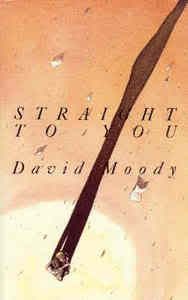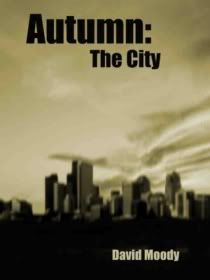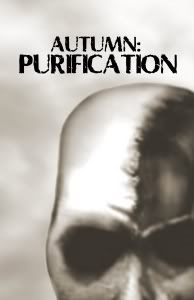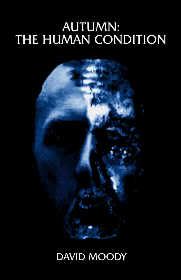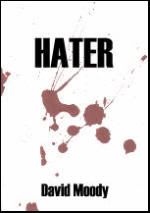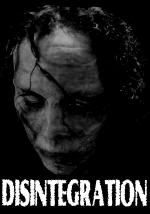David Moody
by
Wayne Simmons
(aka Spiral)
I rarely get a chance to enjoy sunshine. It’s an Irish thing. Sure we have the odd good day here and there, the occasional ice cream in the park, one or two lazy Sunday afternoons spent lounging on a deck chair, swatting wasps with a newspaper…
…But before you know it, Autumn creeps in...
In its trail, decay reigns. Leaves turn a sickly yellow and crumble lifelessly. Flowers lie rotting around the roots of bushes that flourished through the summer. Branches everywhere appear barren and ghoul-like, shedding almost every sign of life to become skeletal shadows of their former selves. In autumn, the only thing to thrive is the cold night air and ever-increasing darkness…
This is the world into which David Moody introduces us to his apocalypse. Fitting, really, to have the human race join the rest of nature rotting on the ground. Strange, though, that Moody’s human race soon get on their feet again, no longer withering and fermenting on the ground amongst the flowers and leaves. Instead they’re rotting as they walk, slowly reanimating to become primal and deadly shadows of their former selves. Meet David Moody’s zombies.
I met them online about six months ago. I had been trawling through the web, trying desparately to find quality writing on the well-oiled genre of zombie apocalypse. Everyone and their undead dog were at it. Fan-fiction, short stories, comics, remakes, rewrites aplenty. There was no shortage of material, but there was something of a famine when it came to quality material. I was close to throwing in the towel when I happened upon David Moody’s infected.
Here was a writer so confident of his work that he was offering his first novel as a free download. Wary of a catch, I checked for small print. Still somewhat suspicious, I downloaded Autumn and set about reading from my computer screen. Within a couple of hours, I’d not only greedily devoured every word of David’s first instalment in the Autumn trilogy, but also ordered the second. A few short months down the line and I had worked through every book in the Autumn series and anything else Moody had penned.
I was hooked. Hooked by a refreshingly normal bunch of disparate survivors, hooked by an almost credible, cheddar-free, undead horde set amongst Moody’s English landscape. Hooked by powerful and compelling writing, the like of which I hadn’t enjoyed since reading Richard Matheson’s I am Legend.
When I caught up with David in cyberspace, I discovered a man as delightfully human as the survivors in his undead trilogy. Married with four children (’I live with five women - now you can see why I write about death, destruction and misery??!’), David has his gripes and grumbles like the rest of us (’I’m sick of contrived, happy-endings and square-jawed, all-American heroes.. The current spate of remakes of perfectly good horror films..’) However his passion for both the horror genre and writing is obvious. An aspiring writer myself, I was keen to find out how David’s novel approach to becoming a author had developed just as much as the Autumn trilogy itself.
----------
Spiral: You have gone about distribution and publicity in an interesting way giving your first book away for free and largely handling the whole process yourself principally over the Internet. Other authors in niche areas (like this sub-genre and others) have said how important the Web is for them - has your approach worked as well as you expected?
David Moody: After the release of Straight to You (David’s first novel) through a ‘traditional’ publisher in 1996 I did a lot of thinking. Like 99% of the books published each year, it didn’t make the best-seller list. In fact, it didn’t make any kind of list! By the time Autumn was finished the Internet was thriving and it seemed an obvious solution – a low cost advertising medium with the potential to reach just about anyone, anywhere. I made contact with a few people who steered me in the right direction with eBooks and everything has evolved organically from there.
The free novel principle was a logical step for me to take. Before Autumn no-one had heard of me, so the chances of them wanting to read and buy my books would have been pretty much zero. Think about it for a second – would you buy a book or a CD or DVD by someone you’d never heard of? I probably wouldn’t without a recommendation. At the same time, it’s human nature to grab anything you can get for free, even if you don’t need it! Offering the first Autumn book as a free download gave me a way of getting people into my work at no risk to them and relatively little cost to me. From a marketing point of view, I knew that there would be at least two more books in the Autumn series – my business logic said if I gave people the first book, some of them would go on to buy the second and the third etc. and that’s worked.
SP: You mention on the blurb of Straight to You that you are interested in 1950’s horror movies. Could you give us a couple of examples of the films you mean?
DM: I love horror films from any era, but there’s something special about films made in the late 50’s by people like Roger Corman and Samuel Z Arkoff etc. like The Last Man on Earth, The Day the World Ended and Brain from Planet Aros. I guess it’s the lack of pretence that appeals, and the fact that so many of them have an apocalyptic theme.
SP: How have these films influenced your writing?
DM: How people and society in general would react to an impending / happening Armageddon fascinates me and it’s something that runs through much of my work. Most people today, however, can’t see past the cheesy production values and hammy acting in these films, and they fail to appreciate that they entertain (perhaps for the wrong reasons) and that some of them actually have something relevant and important to say.
SP: Straight to You is written from the perspective of a bank manager at 26. Obviously that would have been your own situation not too long ago. How much of yourself do you put into writing?
DM: The character was very definitely me at that particular stage in my life, but I haven’t written anything else as blatantly autobiographical since. Obviously the plots of my books are entirely fictional, but the locations I write about and the characters which inhabit them are all based on people I’ve met and places I’ve been to (with, of course, the names changed to protect the innocent!) During my time with the bank I worked in a number of large processing centres around the country and I looked after literally hundreds of staff over the years. They used to joke about appearing in my novels, and now many of them have!
SP: The Autumn trilogy, particularly the first in the series, would draw some influence from the films of George A. Romero. Are you a fan of George’s work, or indeed, the zombie genre?
DM: Romero is a hero. Without Night of the Living Dead I don’t believe there would be a zombie genre to speak of. He set the rules and the standards for everything that followed. I was very young (too young) when I first saw Night – I watched it with a group of friends in darkness during a massive thunderstorm – and it left a huge impression on me. Like many people, though, I have to say that I found Land of the Dead to be an enormous disappointment. I thought it was a weak and nonsensical story that added nothing to the genre. I can‘t understand why, after setting the bench-mark himself for so many years, Romero felt the need to make a film which seemed more influenced by the current crop of zombie films than his own original legendary trilogy.
SP: What attracted you to writing about these creatures?
DM: Without a doubt zombies are the greatest of all movie monsters, but they’re also probably the easiest to present on screen and, unfortunately, the easiest to screw-up. For every decent zombie film there are probably 10+ awful ones, and that often casts the whole genre in a bad light. Inspired by Romero, in my books I try to make even the most unbelievable subjects seem plausible and possible. But where Romero concentrated each of his original three films on a small group of survivors, through the course of the series I’ve tried to show the effect of the disaster on a much wider scale. The most unnerving aspect of the living dead is (to quote a film – can’t remember which one) ‘they are us and we are them’. Zombies terrify me because we spend pretty much all of our time surrounded by them. Anyone is a potential victim and, therefore, also a potential zombie. And if the unthinkable happened, how would we cope? I imagine I could handle disposing of the bloke who lives next door (God knows I’ve been tempted) but how would I deal with having to destroy something that used to be my wife, or my brother, or my parent or even my child? It’s those kinds of questions that fascinate me and which have kept me writing about the living dead for the last five years.
SP: You seem to go into a lot of detail about the actual struggle for survival of Steve in Straight to you and your disparate group of humans in the Autumn books. Would you see this as in any way an important metaphor for the human race’s plight in general?
DM: Most people seem to take their continued existence for granted without realising just how fragile their precious little realities actually are. The fact of the matter is that it doesn’t take much to turn everything upside down. You only have to look at world events over the last few years to see how true that can be. In the overall scheme of things, as a species we’re pretty bloody insignificant! In comparison to the lifespan of the planet we live on, our individual lives are over in the blinking of an eye. That’s really the theme I’ve tried to expand on in the Autumn books, particularly the last two volumes. Without giving too much away, towards the end of the original trilogy some of the characters begin to question why they’re running and why they’re struggling to survive when the odds are continually stacked against them. What’s the point? Why bother? We’re programmed by society to try and keep going, and in essence that’s the ‘Human Condition’ I write about. I think it’s also the reason why my instinct-driven dead bodies continue to drag themselves around pointlessly. It’s what they always used to do…
SP: What attracts me most to the Autumn series is that the survivors are very real. They are not glamorous or naturally heroic. Rather they are flawed characters with their own strengths and weaknesses, hopes and fears. We have representations from all parts of society in there.
DM: I’ve always made my characters everyday people – people like you and me or your next-door neighbour or the guy across the street. I think that by concentrating on ‘regular’ people and locations my books become more believable and it’s easier for readers to be able to identify with events and become absorbed in the story. A lot of fiction tends to dwell on perfect, skilled, enigmatic, beautiful people to save the day. In my books I write about ‘real’ people and, if we’re honest, most real people are flawed, aren’t they?
SP: Was it intentional to have some of the less likeable characters escape?
DM: I try to make the actions of my characters believable, and that inevitably means that some people will end up looking out for themselves at the expense of others. I guess that’s why some of the less likeable characters survive. It’s self preservation. Because they’re so self-centred they manage to keep themselves out of trouble and avoid putting themselves at risk. The reverse of that logic also applies and the decent people – the folks you really want to make it – often don’t. That’s certainly true of events in Autumn: Purification.
SP: Phil Croft, the smoking medic, was one of my favourite characters in the series. We watched him get more and more jaded as time went on, soon losing sight of his medical vow to help preserve the lives of others. Did you have any favourite characters which you particularly liked?
DM: I also liked Phil. I think he’s the one who realises sooner than anyone else that the situation these people find themselves in is ultimately hopeless. The change in his attitude throughout the story is mirrored by the rest of the group, but they take a lot longer to come to the same conclusions and realisations. I also like Jim Harper, one of the incidental characters from Purification because the death of the rest of the world is actually something of a blessing to him and in a perverse way he’s quietly thankful.
SP: Which of the characters in the Autumn series do you most see yourself in?
DM: I have to be very predictable here and admit that Michael is the character closest to me. Throughout the writing of the books I often thought ‘what would I do here?’ and Michael’s reactions frequently mirrored my own.
SP: You’ve just released a companion/ sequel to the original Autumn trilogy. Are there any plans to continue the series in the future?
DM: I intended to finish the series with The Human Condition but I’ve since had a change of heart. I’m presently working on Autumn: Disintegration which is a new novel set in the Autumn world but completely separate to any of the previous books. As long as I can find something interesting and different to say and there are characters worth writing about I think I’ll probably keep churning the books out! That’s assuming people keep reading them!
SP: Have you any plans to look at any other mediums, such as comics/ animation/ film to tell any of the Autumn story?
DM: Absolutely. I’m very interested in a comic book adaptation. Some of the short stories featured in The Human Condition would work brilliantly. If any artists reading this are genuinely interested, please get in touch! I originally envisaged the first book as a film and I‘ve written the first treatment of a screenplay. Infected Books will, I hope, soon be followed by Infected Films!
SP: What are you working on now?
DM: Apart from Autumn: Disintegration (which I hope to release in July 2006) I’m currently also writing Hater, the first book in a new horror series. It’s not a zombie story, but some of the themes are similar and it should be out in April / May this year. For reasons which I won’t explain yet, the world is rocked by a sudden epidemic of random, unprovoked and apparently unconnected violent physical attacks on individuals. The book follows an average family as society quickly falls apart around them. There’s not a lot of trust around in the world at the moment, but imagine if you couldn’t even trust the people closest to you because you’re terrified that they might kill you… Imagine not wanting to be with the people you love because you’re scared of them and you’re also scared of what you might do to them… I also have an ongoing serialisation (Mark Thane) in progress at www.djmoody.co.uk, a children’s horror novel in the last stages of development and a couple of other books, which are in the early planning stages.
SP: What recommendations would you give authors thinking of following a similar approach?
DM: Go for it! This has been the most incredible ride and to sit back now and look at what I’ve achieved with Autumn so far is great. I think that the Internet has allowed everyone to compete on a level playing field for the first time.
SP: Any general advice for any writers who are just getting started? Possibly things you learned the hard way?
DM: A few things. Firstly, don’t expect to achieve everything overnight. It takes time to finish any piece of writing and to build a name and reputation for yourself. Don’t give up! Secondly, be professional – don’t settle for second best and learn to take criticism on the chin even though it hurts. Thirdly, write for yourself. I don’t believe you can make any writing interesting for readers if you’re not happy to sit and read it yourself.
SP: Finally, have you a top-ten list of zombie films?
DM: I wracked my brain but couldn’t think of my top-ten zombie films. Instead here are some comments on various mainstream zombie films, which have influenced me or just made me think!
1. Night of the Living Dead (original) – revolutionary. Deserves the top-spot purely because of the effect it had on the modern horror film in general. Broke the mould in so many ways – the hero, the downbeat ending and the lack of optimism and hope etc. etc.
2. Dawn of the Dead (original) – as Aliens was to Alien, Dawn is as good as Night because it’s so different. A great portrayal (particularly in the opening scenes) of a world going into meltdown.
3. Day of the Dead – obviously restrained by the low budget Romero was given, but an excellent drama nevertheless. Can’t help wondering what this would have been like if he’d had the money…As I mentioned earlier, it’s a shame that Land of the Dead was so bloody awful because it’s tainted the legend of the original trilogy. I try not to think about it…
4. Remakes of the above three (and any other remake, come to think of it) - why do they do it? Apart from wanting to make money and exploit the genre’s huge fan-base, are there any valid reasons for remaking these films? There are huge numbers of new and original zombie stories and ideas circulating at the moment. Like most areas of the entertainment industry, though, the vast majority of film studios are more interested in profit and product than producing anything of any artistic worth.
5. Shaun of the Dead - original and hilarious. This deserves a place in any list because it’s actually a clever and intelligent (and bloody funny) piece of film-making. It works because it’s doesn’t play the zombies for (many) laughs. At its heart it’s a straight zombie apocalypse film that just happens to have a couple of idiots in starring roles.
6. 28 days later – had to mention this because of the hundreds of emails I got when it first came out. Was it inspired by Autumn at all? I have no idea. There are some scenes which make me wonder… Wherever the inspiration came from, I love the tone and feel of the film, until the final reel. In my opinion it has one of the most disappointing endings in film history. I’m not convinced that we need the forthcoming 28 weeks later but I won‘t complain if it stirs up the debate about Autumn again!
7. Italian zombie films – a huge generalisation but, sorry, they don’t do anything for me. As a writer who goes for realism, any mention of voodoo and cannibalism immediately makes me switch off.
8. Return of the Living Dead – part one – original and fun, part two – not original and less fun, part three – excellent because it’s so different.
9. Brain Dead – Incredible energy, great laughs and huge amounts of gore! I also admire Jackson hugely because of his first film, Bad Taste, which he made in a similar way to the way I’ve published the Autumn books (i.e. on his own!)
10. Resident Evil 1 and 2 – part one – shit, part two – more shit. Why have I included these? Just because they’re a prime example of how not to do it.
David Moody’s ‘Autumn’ trilogy is available on E-Book or paperback form from his website ‘www.theinfected.co.uk.’ There you can download the first novel in the series for free. His work is also available through Amazon.com
